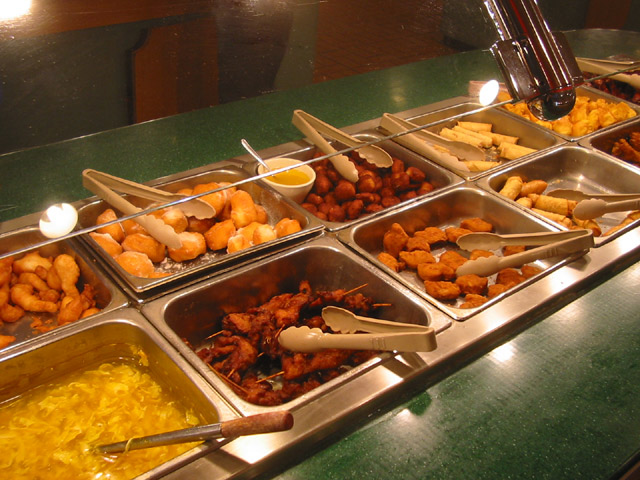戒單::戒停頓
物味取鮮,全在起鍋時極鋒而試;略為停頓,便如黴過衣裳,雖錦繡綺羅,亦晦悶而舊氣可憎矣。嘗見性急主人,每擺菜必一齊搬出。於是廚人將一席之菜,都放蒸籠中,候主人催取,通行齊上。此中尚得有佳味哉?在善烹飪者,一盤一碗,費盡心思;在吃者,鹵莽暴戾,囫圇吞下,真所謂得哀家梨,仍復蒸食者矣。余到粵東,食楊蘭坡明府鱔羹而美,訪其故,曰︰「不過現殺現烹、現熟現吃,不停頓而已。」他物皆可類推。
List of Things to Avoid::Delays
To get the most of a dish’s flavours, it is best to serve it as soon as it has been finished. Consuming food that has been delayed can be likened to wearing an old mildewed robe; even one made of the finest material and finished with the most exquisite details will not make it more enjoyable nor smell better.

Some banquet hosts are rather impatient in nature, insisting that all dishes must be brought to the table at the same time. To make this happen, the kitchen staff would prepare all the banquet’s dishes before-hand, keep them warm in a steamer, and await the signal from the host to bring it all to the table. Can these dishes be expected to have any flavour left after such a long delay? It is interesting that on one side, a good cook toils to perfect the details in every bowl and dish of food produced, but when the food gets to the people who eat, it is violently swallowed without tasting, regardless of its state.[1] This is as wasteful as if one received some delectably crisp Aijia pears, and insisted that they be steamed for eating.[2]
While traveling in Guangdong province, I had an incredibly good rice-eel soup in Yanglanpoming prefecture.[3] When I inquired on the secret of making a dish so perfect, I was told: “The eel was killed and cooked to your order and served the moment it is done without delay. That is all.” This principle should be applied to all aspects of food preparation and serving.[4]
Random notes:
[1]: The line “鹵莽暴戾,囫圇吞下” combines the violent coarse nature of barbaric creatures and porcine-natured individuals into one elegant phrase. The latter part of the phrase likely came from the part of the story in Journey to the West where the greedy pig-headed character, Bajie, gobbled down a delicate fruit of immortality without so much as tasting it. (《西游记》第二四回:“﹝ 八戒 ﹞见了果子,拿过来,张开口,轂轆的囫圇吞咽下肚)
[2]: The famous Aijia pear or Ai pear (哀家梨) has been lauded since Han dynasty in literature for it’s large size and remarkably crisp yet tender texture. This contrasts with the more standard Asian pear, the Ya pear, which although crunchy tends to be much tougher and is thus sometimes steamed for eating. The reason why Yuan Mei mentioned steaming pears here is because of the Chinese idiom: “Steaming Ai pears for eating” (哀梨蒸食), which points to the fact that a foolish person has no idea of the quality of the thing they have in their hands and thus proceeds to ruin it; like destroying the texture and flavours of delicate Aijia pears by steaming. The idiom was itself derived from a section in ShiShuo XinYu which told of people in a certain part of China using it as an insult. (《世說》曰:桓南郡,每見人不快,輙嗔云:「君得哀家梨,復蒸食否?」舊說秣陵有哀仲家梨,甚大如升,入口消釋。言愚人不別,得好梨蒸食之。) “Steaming Ai pears for eating” would be like somebody making Sangria or Kalimotxo with a Château Pétrus or stewing fois gras for a meal. A family friend told me that she once gave an award winning (and rather pricy) Taiwanese High-Mountain oolong to her Western in-laws. When asked about the tea, the in-laws complained that its brew was so light that they had to use to whole tin of tea leaves to get the colour right, but then the brew was too bitter to drink, so they dumped everything. My mother-in-law did something similar, taking some of the best tea I have and mixing it with turmeric and ginger to make a health drink. I guess the concept being described here by Yuan Mei is somewhat similar to the Western idiom: “Pearls before swine”.
[3]: Yuan Mei wrote the Yanglanpoming prefecture Book (楊蘭坡明府書). I guess he ate some eel while doing the research.
[4]: My Europeans friends seems to always prefer their food cold. When served a steaming bowl of noodle soup, they would stir it forlornly until everything is limp and lukewarm, all while stating how it’s too hot. Even fried-chicken, which is best served soon after it has been fished out of boiling fat, would be left untouched on the plate until it’s cold and lifeless. I have to admit I’m helplessly annoyed by this; don’t they know how hard it is to perfectly time finishing and serving the food? This contrasts with East Asian friends who would dig-in, piping hot morsels and all, appreciating that you served the food in the best and freshest state possible. Perhaps Western folks expect foods to be served at the “right” temperature, while Chinese folks expect that foods be served as soon as it’s ready. This may explain why “resting” something after cooking is so common in Western cuisine (roast and grilled meats, bread, etc.) while such concepts are considered odd or pointless in Chinese cuisines. Thankfully, unlike their European cousins, it seems North Americans don’t have the same behavior for waiting on food to become tepid before eating it.
One thought on “Things to Avoid 6: Delays (戒停頓)”